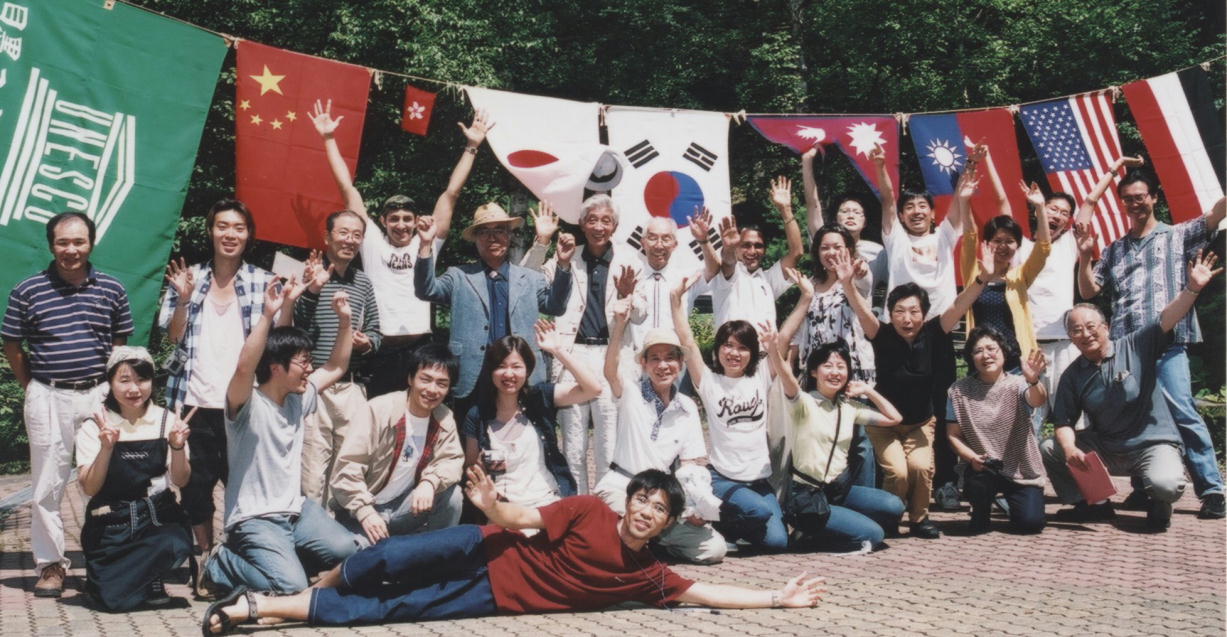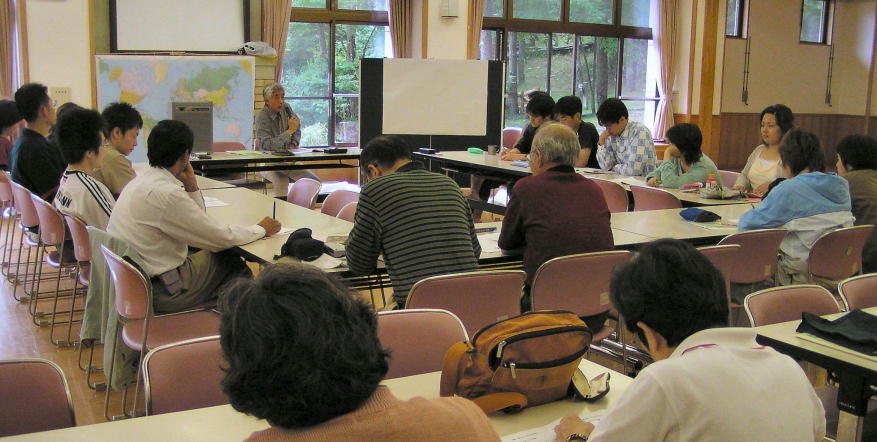No.210ü[éQ
15th International Friendship Youth
Retreat: report
Dates: July 25 (Sun.) ~ July 27
(Tue.), 2004 Place: Meguro Citizens'
Nature Village (Wada-mura, Nagano Pref.)
Organised by: Meguro UNESCO Association / Youth Activity
Committee (Leader: Genta Atoji, Mieko Morita)
Supported by: Meguro Board of
Education, Meguro International Friendship Association, Japan Student Services
Organisation,
Komaba International House, National Federation of UNESCO
Associations in Japan (NFUAJ)
Participants: 23 participants; students and adults
from 7 nations (Japan, Yemen, Korea, Taiwan, China, Nepal, and America)
Theme of this year : Let's
Discuss Volunteer Activity!
 |
The 15th International Friendship Youth
Retreat started on July 25, for the convenience of the dormitory hall. The
number of participants was much less than usual, partly because many students
were still sitting for the term examinations at the time. Nine advisers and
only 14 youths participated. We tried hard to talk with each other, learn
together and deepen each otherüfs understanding, so we were able to gain a lot
through sharing views in this relatively small group. This was a very wonderful experience. |
|
On
the first day: We
arrived at the venue at noon, almost at the scheduled time. After the opening
ceremony, we spent time in a relaxed manner. We had group meeting from the evening
until bedtime.
On
the second day: 6 oüfclock in the morning, about ten persons participated in radio
gymnastic exercises. After breakfast, Professor Eiji Hattori gave us a lecture
that lasted more than 2 hours. After lunch, Professor Shigeo Tajima gave us a lecture.
He prepared handouts regarding üevolunteer activitiesüf and we spent substantial
time over them. Discussion in small groups became so heated that we were able
to have valuable time to share the findings in the presentation meeting on the
following day.
On
the third day: Making presentation of the findings gained in the discussion
on the previous day; collecting impromptu writings on the flag; exchanging
messages; taking pictures under the flag; and having lunch. We left the camp
place at 1:30 and came back to Nakameguro in the evening, both on time as we
previously scheduled. Dismiss.
|
The
notable feature of this year: Most of the
participants attended the retreat for the first time. We could not have enough
time for the staff meeting before the retreat. However, each participant seemed
to obtain great fulfilment, chiefly because they were able to have sense of
solidarity, taking advantages of ease in communication due to the small size of
the party. Another notable thing was that each of the lectures given by the
lecturers was very substantial. It is a pity we cannot publish the entire
contents of the lectures here. We are now thinking of the possibility of
publishing them on our home page.
 History of UNESCO: His speech started from the International
Committee for Intellectual Co-operation before World War II, which was the
predecessor of the UNESCO. After the foundation of the UNESCO, it faced big
transitions three times every 15 years.
History of UNESCO: His speech started from the International
Committee for Intellectual Co-operation before World War II, which was the
predecessor of the UNESCO. After the foundation of the UNESCO, it faced big
transitions three times every 15 years.
These four phases were as follows:
ç@since 1945: the axis of east and west (America-Soviet
confrontation)
çAsince 1960: the axis of south and north (many
new countries were born in the south, emerging from colonial rule)
çBsince 1975: New World Order (the world of
Co-Action)
çCsince 1990: culture of peace.
Now is the time to emphasise üepeaceüf which is
the original principle of the UNESCO, as if the hands of a clock revolve to
return to the original point. Following these phases, Professor Hattori presented
a wide range of topics, including the origin and history of the local UNESCO
activities in Japan; the politicisation of the UNESCO (withdrawal and
re-affiliation of both America and the Soviet Union); and the features of
UNESCO activities (although the organisation has limited fund, it will change
the world by creating a commotion) and etc.
UNESCOüfs
Top Priority Policy:
ç@Basic Education (He mentioned UNESCOüfs activities
including üeEducation for Allüf and üeliteracy educationüf with concrete examples.
Countries, which achieved comprehensive provision of primary education,
especially basic education for girls, surely succeeded in decreasing birth
rate. UNESCO was the first advocator of
the importance of basic education being a single measure to resolve a
population explosion, the depletion of natural resources, and environmental
problems)
çAImportance of studying science and environmental problems çBImportance of protection of cultural heritage and cultural diversity
(üeUniversal Declaration on Cultural Diversityüf is very important next to üeUniversal
Declaration of Human Rightsüf)
UNESCO and its Volunteer Activities: Prof. Hattori mentioned that one of the
features of volunteer activities was diversity, and compared it with
governmental activities, which require unity. Therefore, he mentioned, people
should co-operate beyond political boundaries and contribute themselves to
volunteer activities in order to make world peace realised.
His lecture was very rich in content, based
on his experience of working actively at UNESCO Paris headquarters for 21
years.
next Page

 History of UNESCO:
History of UNESCO: